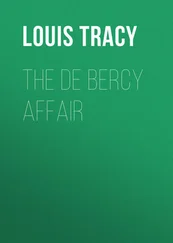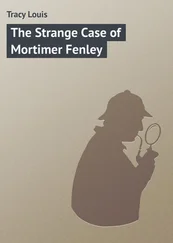Louis Tracy - The Late Tenant
Здесь есть возможность читать онлайн «Louis Tracy - The Late Tenant» — ознакомительный отрывок электронной книги совершенно бесплатно, а после прочтения отрывка купить полную версию. В некоторых случаях можно слушать аудио, скачать через торрент в формате fb2 и присутствует краткое содержание. Жанр: foreign_prose, на английском языке. Описание произведения, (предисловие) а так же отзывы посетителей доступны на портале библиотеки ЛибКат.
- Название:The Late Tenant
- Автор:
- Жанр:
- Год:неизвестен
- ISBN:нет данных
- Рейтинг книги:5 / 5. Голосов: 1
-
Избранное:Добавить в избранное
- Отзывы:
-
Ваша оценка:
- 100
- 1
- 2
- 3
- 4
- 5
The Late Tenant: краткое содержание, описание и аннотация
Предлагаем к чтению аннотацию, описание, краткое содержание или предисловие (зависит от того, что написал сам автор книги «The Late Tenant»). Если вы не нашли необходимую информацию о книге — напишите в комментариях, мы постараемся отыскать её.
The Late Tenant — читать онлайн ознакомительный отрывок
Ниже представлен текст книги, разбитый по страницам. Система сохранения места последней прочитанной страницы, позволяет с удобством читать онлайн бесплатно книгу «The Late Tenant», без необходимости каждый раз заново искать на чём Вы остановились. Поставьте закладку, и сможете в любой момент перейти на страницу, на которой закончили чтение.
Интервал:
Закладка:
Harcourt found that in London it was helpful to use Americanisms in his speech. People smiled and became attentive when new idioms tickled their metropolitan ears. But the mention of the dead tenant of No. 7 Eddystone Mansions froze Dibbin’s smile.
“What about her? Poor lady! she might well be forgotten,” he said.
“So soon? I suppose you knew her?”
“Yes. Oh, yes.”
“Nice girl?”
The agent bent over some papers. He seemed to be unable to bear Harcourt’s steady glance.
“She was exceedingly good-looking,” he answered; “tall, elegant figure, head well poised, kind of a face you see in a Romney, high forehead, large eyes, small nose and mouth – sort of artist type.”
“Wore a lot of lace about the throat?”
“What? You know that?”
“Oh, don’t be startled,” said Harcourt. “There is her head in chalks you know, over the mantelpiece – ”
“Ah, true, true.”
“I wonder if it was she or some other lady who was in my flat last night at half-past eleven.”
Dibbin again started, stared at Harcourt, and groaned.
“If it distresses you, I will talk of something else,” said Harcourt.
“Mr. Harcourt, you don’t realize what this means to me. That block of buildings brings me an income. Any more talk of a ghost at No. 7 will cause dissatisfaction, and the proprietary company will employ another agency.”
“Now, let us be reasonable. Even if I hold a séance every night, I shall stick to my contract without troubling a board of directors. I am that kind of man. But, meantime, you should help me with information.”
Dibbin blinked, and dabbed his face with a handkerchief. “Ask me anything you like,” he said.
“When did Miss Barnes die?”
“On July 28 of last year. She lived alone in the flat, employing a non-resident general servant. This woman left the flat at six o’clock on the previous evening. At half-past eight A. M. next day, when she tried to let herself in, the latch appeared to be locked. After some hours’ delay, when nothing could be ascertained of Miss Barnes’s movements, though she was due at a music-master’s that morning and at a rehearsal in the afternoon, the door was forced, and it was discovered that the latch was not only locked but a lower bolt had been shot home, thus proving that the unhappy girl herself had taken this means of showing that her death was self-inflicted.”
“Why do you say that, if a coroner’s jury brought in a verdict of ‘Death from Misadventure’?”
Mr. Dibbin’s eyes shifted again slightly. “That was – er – what one calls – ”
“I see. The verdict was virtually one of suicide?”
“It could not well be otherwise. She had purchased the sleeping-draft herself, but, unfortunately, fortified it with strychnine. How else could the precautions about the door be explained? That is the only means of egress. Each window is sixty feet from the ground.”
“Did she rent the flat herself?”
“No. That is the only really mysterious circumstance about the affair. It was taken on a three years’ agreement, and furnished for her, by a gentleman.”
“Who was he?”
“No one knows. He paid cash in advance for everything.”
David was surprised. “Say, Mr. Dibbin,” he queried, “how about the ‘references’ upon which the over-landlord insisted in my case?”
“What are references worth, anyhow?” cried the agent, testily. “In this instance, when inquired into by the police, they were proved to be bogus. A bundle of bank-notes inspires confidence when you are a buyer, and propose to part with them forthwith.”
“Surely suspicions were aroused?”
The agent coughed discreetly. “This is London, you know. Given a pretty girl, a singer, a minor actress, who leaves her home and lives alone in apartments exceedingly well furnished, what do people think? The man had sufficient reasons to remain unknown, and those reasons were strengthened ten-fold by the scandal of Miss Barnes’s death. She left not even a scrap of paper to identify him, or herself, for that matter. All we had was his signature to the agreement. It is, I believe, a false name. Would you care to see it?”
“Yes,” said David.
Dibbin took some papers from a pigeonhole. Among them David recognized the deed he had signed a few days earlier. A similar document was now spread before him. It bore the scrawl, “Johann Strauss,” with the final S developed into an elaborate flourish.
“A foreigner,” observed David.
“Possibly. The man spoke excellent English.”
“Have you ever heard of Lombroso, Mr. Dibbin?”
“Lombroso? I have seen the name, somewhere in Soho, I think.”
“Not the same,” said David with due gravity. “The man I mean is an Italian criminologist of great note. He lays it down as a principle that a signature of that kind is a sign of moral degeneracy. Keep an eye on those among your clients who use such a flourish, Mr. Dibbin.”
“Good gracious!” cried the agent, casting a glance at the well-stuffed letter-cases of his office. How many moral degenerates had left their sign manual there!
“Two more questions,” went on Harcourt. “Where do Miss Barnes’s relatives reside?”
“Her name was not Barnes,” was the instant answer; “but I am pledged to secrecy in that regard. There is a mother, a most charming woman, and a sister, both certainly most charming ladies, of a family very highly respected. They did not discover the unhappy girl’s death until she was long laid to rest – ”
“Then, why is the flat still in the condition in which Miss Barnes inhabited it?”
“Ah, that is simple enough. Isn’t the agreement valid for nearly a year yet? When that term expires, I shall dispose of the furniture and hand over the proceeds to the young lady’s heirs-at-law, subject to direction, of course, in case the real lessee ever puts in a claim.”
David strolled out into the crowded solitude of the streets, with a vague mind of Gwendoline Barnes and Johann Strauss, two misty personalities veiled under false names. But they so dwelt in his mind that he asked himself if he had fled from the pursuit of a living woman in far Wyoming to be haunted by a dead one in England? Like most strangers in London, he turned to the police for counsel, and told to an inspector on duty at a police-station his tale of the whiff of violets, of the extinguished light in his corridor, and of the real or fancied brush of a woman’s skirt somewhere against wall or carpet. He was listened to with kindliness, though, of course, without much faith. However, he learned from the inspector the address of the coroner’s court where the inquest had probably been held; it was near by, and David’s steps led him thither. There he asked some questions at haphazard, without picking up anything of fresh interest; unless it was that “Gwendoline Barnes” lay buried in Kensal Green cemetery.
It was now late in the afternoon. He strolled down Tottenham Court Road into Holborn, ate a deferred luncheon in Oxford-St., and started to saunter back home, shirking a theater matinée, which was irksome since it was the fixed thing on his program. But it struck him half-way home that his charwoman was gone, that the flat was lonely; he got into a cab, saying to the driver: “Kensal Green cemetery!”
Some electric lamps were a-flicker already in the streets. It was nearly the hour at which London roars loudest, when the city begins to pour out its hordes, and vans hurry to their bourne, with blocks in the traffic, and more haste, less speed. When he reached the cemetery the closing time was imminent.
A little snow lay among the graves, through which the grass-tufts showed, making a ground of black-and-white. Some few stars had ventured to peep from the wintry sky. A custodian supplied David with the formal information which he sought. The plot of ground had been bought in perpetuity; it was in a shaded place a good distance from the entrance; an Iona cross, erected by friends, marked the spot, bearing the one word, “Gwendoline.”
Читать дальшеИнтервал:
Закладка:
Похожие книги на «The Late Tenant»
Представляем Вашему вниманию похожие книги на «The Late Tenant» списком для выбора. Мы отобрали схожую по названию и смыслу литературу в надежде предоставить читателям больше вариантов отыскать новые, интересные, ещё непрочитанные произведения.
Обсуждение, отзывы о книге «The Late Tenant» и просто собственные мнения читателей. Оставьте ваши комментарии, напишите, что Вы думаете о произведении, его смысле или главных героях. Укажите что конкретно понравилось, а что нет, и почему Вы так считаете.












